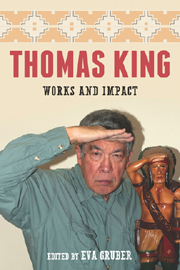Preface
Published online by Cambridge University Press: 05 February 2013
Summary
Tom king changed my life. Now wouldn't that be a great line to start a book. Too bad it isn't true. In fact, even if it was, such an opening wouldn't be “apppproooopriate,” to quote from King's story “Joe the Painter and the Deer Island Massacre” (in One Good Story, That One). At the beginning of such a volume, academic convention has it that I parade Thomas King's merits as a writer and explain why the world desperately needs this book. I'll get to that, I promise. But for now I want to start autobiographically, taking my cues from King's essay “Godzilla vs. Post- Colonial” (1990). King begins this text on the shortcomings and possible alternatives for the term “postcolonial” in the context of Native studies with a seemingly out-of-context account of his short career as a basketball player in high school. Selected by a coach priding himself in his ability to spot talent, King turned out to be a less than mediocre player, by his own account. After one season, an injury to his knee mercifully ended his brief stint as a basketball player. King uses this episode to illuminate the danger of assumptions—whether about the relevance of height to greatness at basketball, or about the suitability of the term “postcolonial” for describing Native literature.
In analogy, I briefly want to trace the road that brought me to this project, since it elucidates a few things about this book and the writer who is its subject. I spent the academic year 1998/99 in Guelph, Ontario, at a university mainly focused on agriculture and veterinary medicine. My home university, the University of Constance, Germany, had an exchange with the biology department at Guelph that was endowed with generous grants, and since I studied both English and biology I had applied and received the grant. Once there I spent most of the first term in the lab, researching the antibiotic capacities of fish mucus. After months among Petri dishes, I was starved for something else, and the funding organization allowed me to take a class in the English department.
- Type
- Chapter
- Information
- Thomas KingWorks and Impact, pp. ix - xiiPublisher: Boydell & BrewerPrint publication year: 2012

